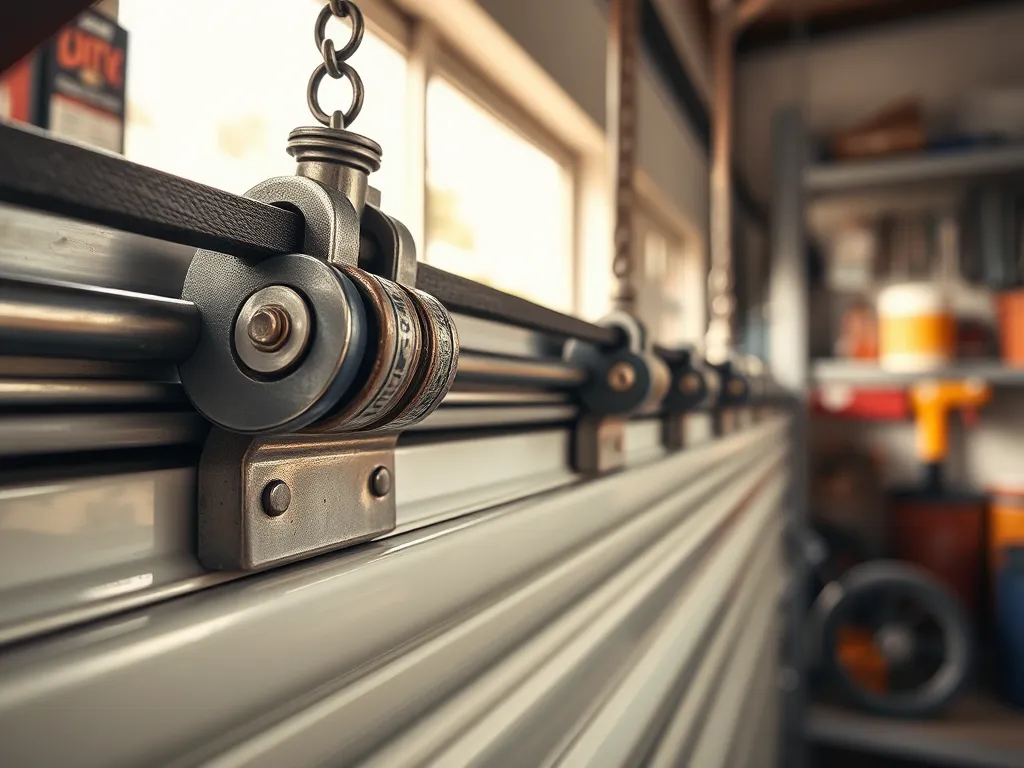Why Lubricating Garage Door Parts is Essential for Longevity

A Comprehensive Guide to Garage Door Maintenance
Garage door maintenance is a crucial aspect of home upkeep that many homeowners overlook. Regular maintenance not only ensures the smooth operation of your garage door but also extends its lifespan. By investing some time and effort into garage door maintenance, you can avoid costly repairs and enhance your home security.
One of the key components of garage door maintenance is lubrication. Proper lubrication minimizes friction between moving parts, which can lead to wear and tear if neglected. Ensuring that all the necessary parts are well-lubricated can prevent future problems and save you money in the long run.
Ensuring smooth operation of your garage door requires periodic inspections and prompt repairs.
Furthermore, garage door maintenance includes inspecting and adjusting components like the springs, tracks, and sensors. A thorough examination can help identify issues before they escalate into serious problems. Regular checks and adjustments are essential for the safety and effectiveness of your garage door system.
Homeowners should also be aware of seasonal changes and how they can affect garage doors. Humidity, temperature fluctuations, and even snow and ice can impact the functionality of your garage door. Therefore, seasonal maintenance is essential to keep everything working smoothly throughout the year.
Prioritizing moving parts lubrication is crucial for reducing wear and tear on garage door mechanisms.
In summary, garage door maintenance encompasses lubrication, inspections, adjustments, and adaptations to seasonal changes. Taking the time to perform these maintenance tasks can enhance the performance and longevity of your garage door system.
Benefits of Lubrication for Garage Doors
Lubrication enhances the smooth operation of garage doors, ensuring they open and close without any hitches. A well-lubricated garage door glides effortlessly along its tracks, which reduces the chances of accidents or damage.
Additionally, regular lubrication reduces wear and tear on moving parts. Over time, friction can cause components to wear down, leading to mechanical failures. Proper lubrication helps parts last longer, minimizing replacement costs and enhancing safety.
Regular garage door maintenance ensures longevity and optimal performance for your home’s entry system.
Lubrication also prevents rust and corrosion buildup. Many garage door parts are made from metal, which is susceptible to rusting, especially in humid conditions. A good lubricant creates a protective barrier that keeps moisture away, thereby prolonging the life of these parts.
Moreover, lubricating your garage door can improve its energy efficiency. When garage door components are working seamlessly, it helps to regulate the temperature inside the garage, which can, in turn, affect your home's overall energy usage. This can lead to lower utility bills and a more comfortable living space.
Types of Lubricants for Garage Doors
Silicone-based lubricants are ideal for weather resistance, making them suitable for outdoor use. They provide long-lasting lubrication and don’t attract dirt, keeping your garage door clean and functional.
White lithium grease is another excellent choice for garage door maintenance, especially for metal parts. This type of lubricant adheres well to surfaces and offers superior protection against friction and wear.
For rusty components, penetrating oils are recommended. These oils are designed to seep into corroded areas, breaking down rust and allowing for easier movement of the parts.
Lastly, there are specialty garage door lubricants formulated specifically for garage doors. These products offer additional benefits, such as UV protection and enhanced rust prevention, making them a valuable addition to your maintenance toolkit.
How to Properly Lubricate Garage Door Parts
To properly lubricate your garage door parts, start by identifying key moving components such as rollers, hinges, tracks, and springs. These are the areas that require attention to ensure smooth operation.
The lubrication process involves a few simple steps: first, clean the parts with a cloth to remove dirt and debris. Then, apply the lubricant to the identified components, ensuring that you coat them evenly. Be cautious not to over-lubricate, as this can attract dirt.
It is recommended that you perform lubrication maintenance at least once every six months. However, if you notice any signs of friction or noise, you should lubricate more frequently.
Signs that your garage door needs lubrication include squeaking or grinding noises, uneven movement, and slow operation. Addressing these issues promptly can prevent further damage and prolong the life of the door.
Common Mistakes in Garage Door Lubrication
One common mistake is using improper lubricants. Not all lubricants are suitable for garage doors, and using the wrong type can lead to issues such as attracting dirt and forming gunk on the components.
Over-lubrication is another issue that homeowners often encounter. Applying too much lubricant can cause excess buildup and attract debris, which can operate against the system's efficiency. It is crucial to follow proper guidelines when lubricating.
Neglecting to lubricate specific parts can lead to potential problems. Homeowners should pay close attention to all parts, including those that are not immediately visible, to ensure thorough maintenance.
Lastly, ignoring safety precautions during lubrication can be dangerous. Always disconnect the garage door opener before performing maintenance and wear appropriate safety gear to protect yourself from potential injuries.
Professional Garage Door Maintenance Services
There are instances when it’s best to call a professional for garage door lubrication. If you notice significant operational issues or if the garage door requires a diagnosis beyond basic maintenance, seeking help from a professional is advisable.
Professionals have the expertise to lubricate garage doors effectively, ensuring that each component receives the proper attention. They use high-quality lubricants and have the experience to identify issues that may go unnoticed by the average homeowner.
When comparing DIY vs. professional lubrication, it is essential to consider safety and convenience. While DIY can be cost-effective, professionals can save you time and provide peace of mind that the job is done correctly.
Costs associated with professional maintenance can vary, but investing in regular maintenance can save you money in the long run by preventing more significant issues and ensuring your garage door operates efficiently.